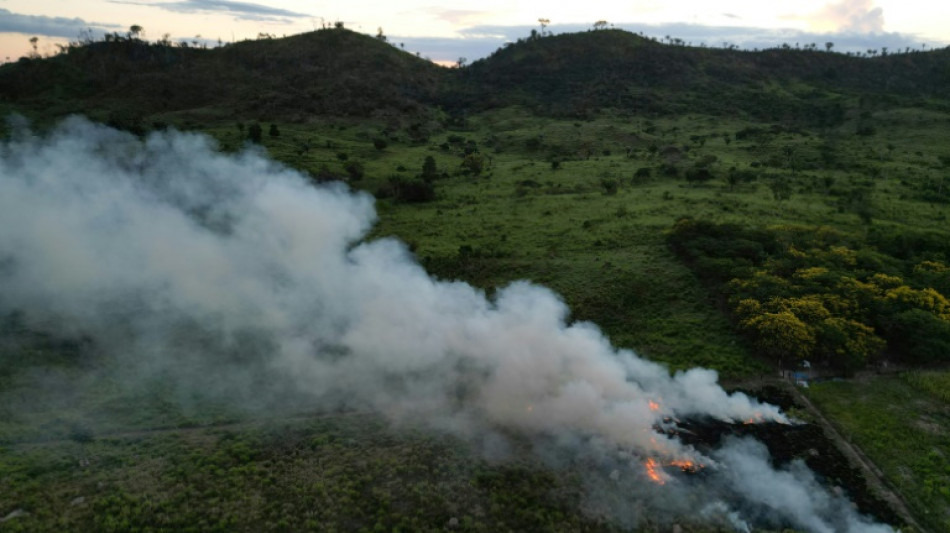

World leaders launch fund to save forests, get first $5 bn
World leaders attending a climate summit in Brazil launched a fund Thursday to save the world's forests, quickly raking in over $5 billion in pledges to reward tropical countries for not chopping down trees.
The initial government commitments still fall far short of what is needed for the fund to attract the private investment it seeks, but Brazil’s President Luiz Inacio Lula da Silva still described the Tropical Forests Forever Facility (TFFF) as unprecedented.
Ultimately, Brazil -- the fund's political sponsor -- seeks to create a $125 billion facility that would pay out a share of profits to developing countries for every hectare of forest they leave standing.
Private investors would also receive a return from funds invested mainly in emerging market bonds.
"Such a fund, which will help us, comes at the right time," Abe Assamoi, an Ivory Coast representative, told AFP in Belem, a city at the edge of the Amazon rainforest.
"We have certainly lost a lot of forests, but we have implemented a comprehensive strategy to reforest our country... We have ambitious goals," but these require money, he added.
The fund was launched in Belem Thursday as heads of state and government met ahead of an annual round of UN climate talks starting next week.
- 'Things can change' -
The designers of the fund envision raising $10 billion in initial contributions from governments within a year -- a figure revised downward in the face of an initial lackluster response.
The $10 billion should be increased to $25 billion in the longer term -- startup money that will then attract private investments worth another $100 billion.
Brazil hopes the fund will create a reliable, long-term revenue stream, an alternative to tropical countries cutting down forests for economic gain.
Earth's forests are often described as its lungs, expelling oxygen and taking in planet-warming carbon while housing a rich variety of animal and plant life.
Brazil had put in the first $1 billion pledge for the fund, matched by fellow forest nation Indonesia.
The UK said it would not contribute, while Finland's government told AFP it would be "difficult to find new resources" in uncertain economic climate.
"Things can change, this is a long-term project," Brazil's chief climate negotiator Mauricio Lyrio told AFP about countries that have not yet joined the initiative.
Brazil’s Finance Minister Fernando Haddad was also positive, saying "we have already surpassed fifty percent of what we envisioned" to raise until the next climate conference in 2026.
France pledged a conditional 500 million euros, Portugal added a more modest $1 million, and Germany made an unspecified commitment.
Norway on Thursday pledged 30 billion kroner ($3 billion) for loans, but with strings attached.
"It is vital to stop deforestation to reduce the impacts of climate change and limit biodiversity loss," the Norwegian government said in a statement.
- 'Weaknesses remain' -
Some countries and observer groups have expressed reservations about the design and oversight of the fund.
Greenpeace has "cautiously" welcomed the TFFF, with its Brazilian executive director Carolina Pasquali telling AFP that "weaknesses remain."
"For example, where the money will be invested, what industries are out. We think it's a good step forward, but it needs work," she said Wednesday aboard the organization's Rainbow Warrior flagship, docked in Belem.
Brazil has identified more than 70 developing countries that could be eligible for annual payments from the fund.
If they were to stamp out deforestation entirely, Brazil, Indonesia and the Democratic Republic of Congo could earn hundreds of millions of dollars a year each.
Mauricio Bianco, vice president of Conservation International Brazil, said forest conservation was the answer to two planetary crises at once: climate change and biodiversity loss.
"These are threats that demand financial commitments commensurate with their scale," he said, adding it was imperative to put the fund into operation as soon as possible.
For Lula, "forests are worth more standing than cut down."
"In a few years, we will see the fruits of this fund. We will be proud to remember that it was in the heart of the Amazon rainforest that we took this step together," he told summit delegates.
burs-np/klm/mlr/dw
A.Galli--MJ


